Arc Browser is now available for all Mac users, Windows version in the works
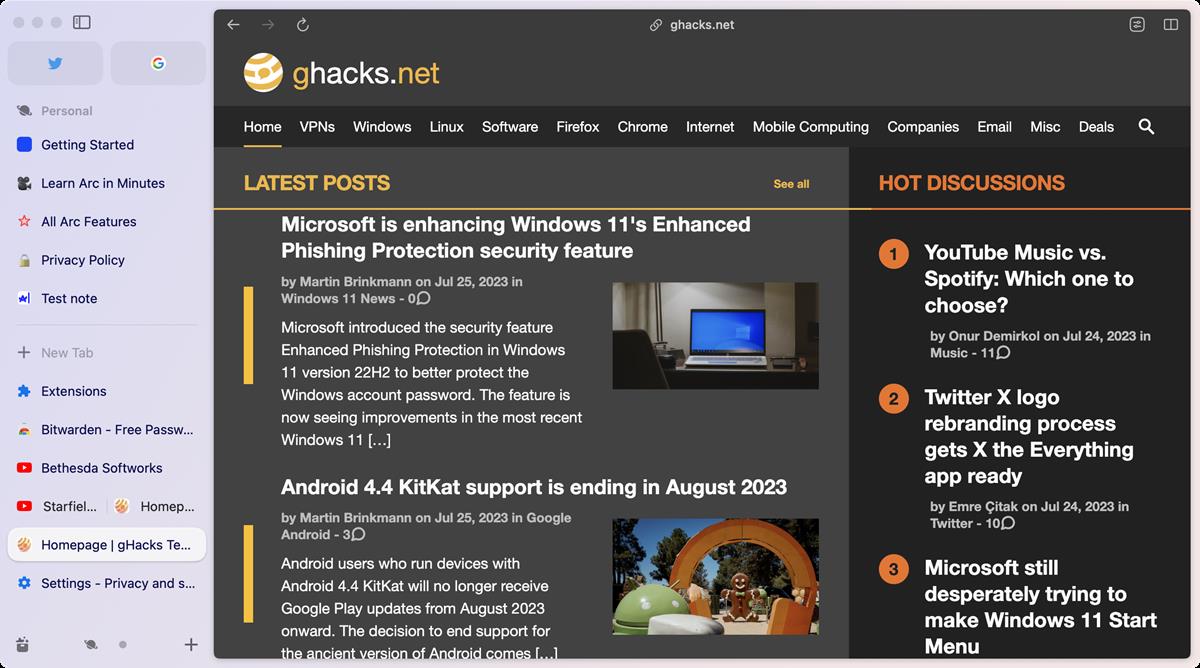
Arc browser has graduated from beta to version 1.0. The Browser Company's app is now available for all users on macOS.
Arc has been in development for 3 years, and until now the only way to access it was via a waitlist, aka a closed invite system. Let's take a look at what it can do.
An overview of Arc Browser
Please treat this article as an overview of the features, not as a full review. You need to sign up for an Arc account to use the browser. You cannot do anything without signing in, it doesn't even let you maximize the app's window or access the settings. This was quite annoying, but I created an account using an email alias to jump over this hurdle.
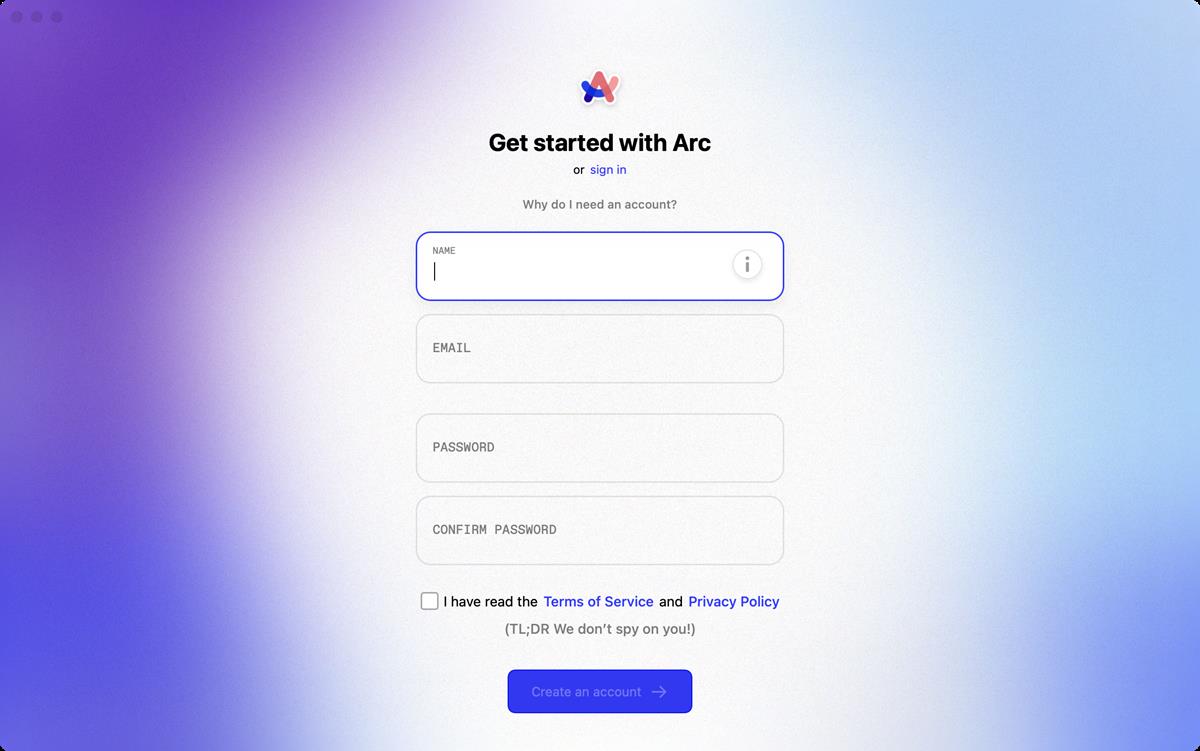
Arc browser is based on Chromium, so it comes with its pros and cons. The important thing here is that Arc supports Chrome extensions, so you can install your favorite add-ons right away. Google is the default search engine in the browser, you can change this from the app's settings.
When you visit a web page, you would normally look for a padlock icon to understand whether the current web page is secure or not. A couple of months ago Google said that users were being misled by the icon as they believed it represented a website's trustworthiness. The Mountain View company is replacing the padlock icon with a details button in September 2023. Well, Arc is doing that already, but not directly on the address bar. You need to mouse over the URL bar and click on the details button, and the app displays a pop-up that tells you whether the site is secure.
Sidebar and vertical tabs
Arc browser has a sidebar oriented interface, i.e., everything that you do involves the side panel on the left for the most part. The top section of the sidebar has the navigation butttons (back, forward, refresh), and the address bar. The rest of the sidebar is divided into 3 sections, with vertical tabs.
The favorites section displays icons for your favorite sites, it almost feels like an app. You can add any site to this section, it supports Previews for a few sites. We'll discuss this in a bit.
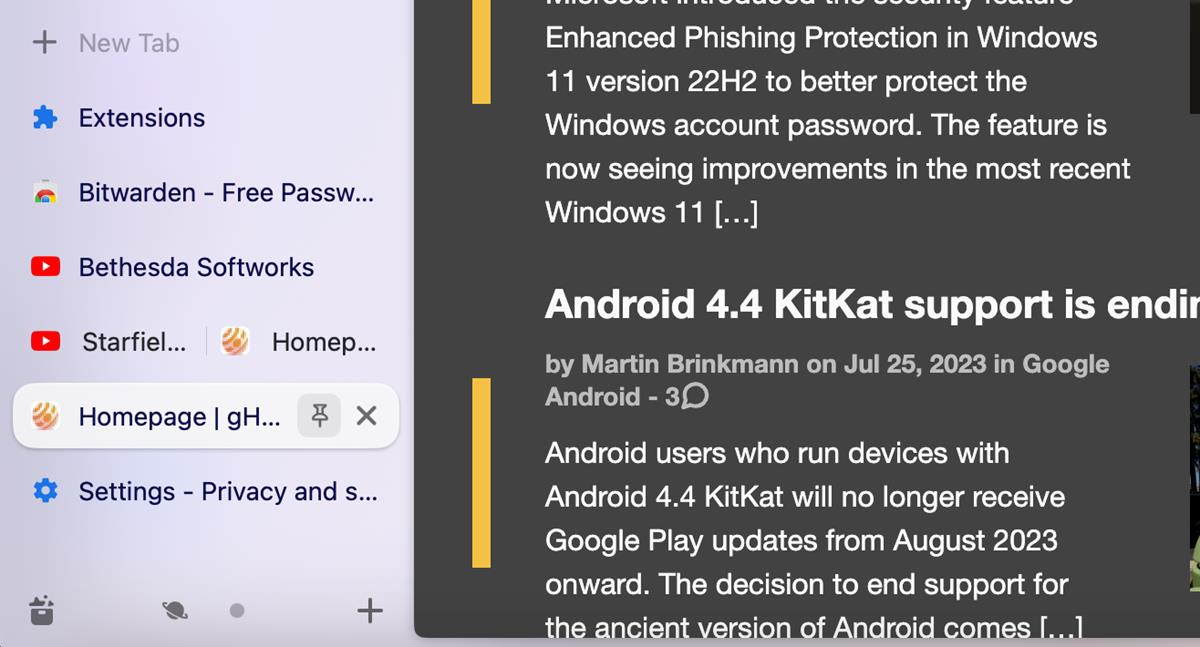
The next section in Arc browser's sidebar are pinned tabs, which as the name suggests are tabs that will be saved permanently. The last of the 3 sections is called today tabs, these are unpinned tabs and are the default tabs that you open while browsing. You can pin a tab by dragging and dropping it to the pinned tab section, or by clicking on the pin button next to a tab. Unpinning a tab involves the same process.
Today tabs are are automatically archived (discarded) after 12 hours. You can tweak this option from the settings. You may also clear the unpinned tabs with one click. If you don't want the sidebar to be displayed permanently, you may toggle it from the View menu. This option automatically hides the side panel, and shows it when you move the mouse cursor to the left edge of the screen.
Spaces and Folders
One of the unique features in Arc browser is called Spaces. A space is a unique sidebar where you can have a collection of tabs (tab groups). For example, your Work space can have a set of tabs, a Personal space may contain different tabs, and so on and so forth. You may customize it per your requirements.
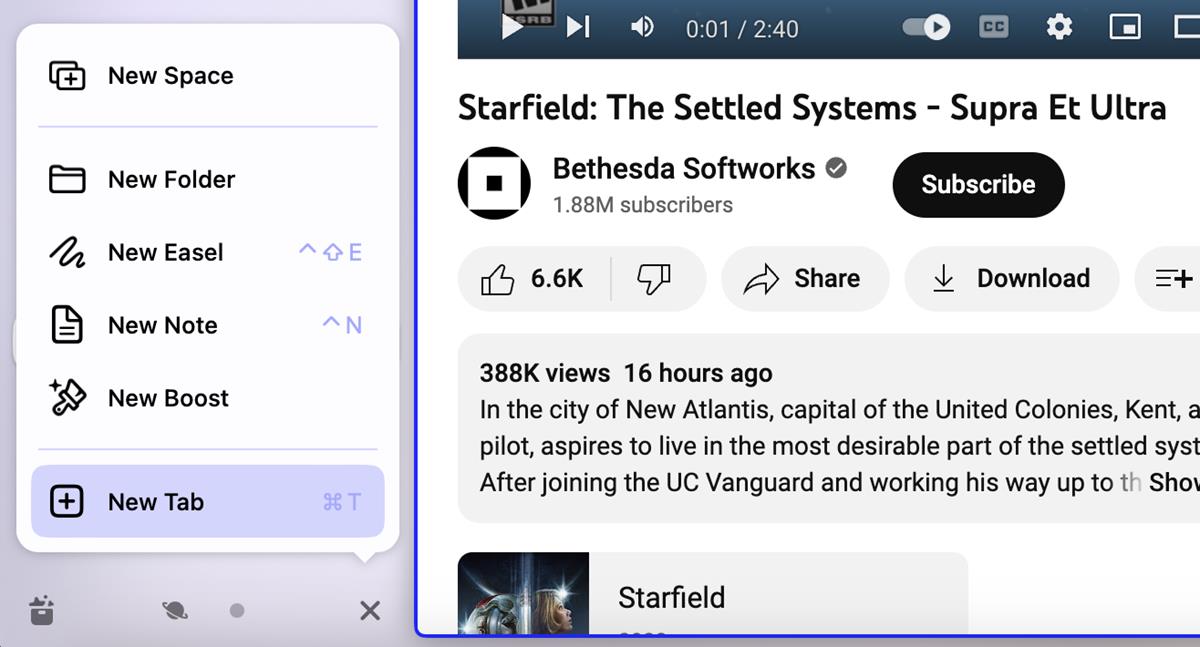
To create a space, click on the + button at the bottom of the sidebar and select New space. You can rename it and change its icon too. Swipe with 2 fingers on the trackpad to switch between spaces, or click on the icons at the bottom of the sidebar. Your favorites (at the top) stay pinned across all spaces.
You can create folders to stash folders together for future access.
Ad Blocker
Arc comes with an ad blocker that prevents ads, trackers, and pop-ups on websites. It works on all websites, even on YouTube. So what's really surprising here? The ad blocker is none other than uBlock Origin, the extension is pre-installed in Arc Browser. You can update it from the Chrome web store, remove it if you don't like it, or install another extension of your choice.
Keyboard shortcuts and Actions
Arc supports a number of keyboard shortcuts. You can trigger them manually or by entering some commands in the command bar. To bring up the bar, press Command and L. It's sort of like macOS' Spotlight, and you can type some keywords to run an action. For example, to open new tab, pin a tab, etc.
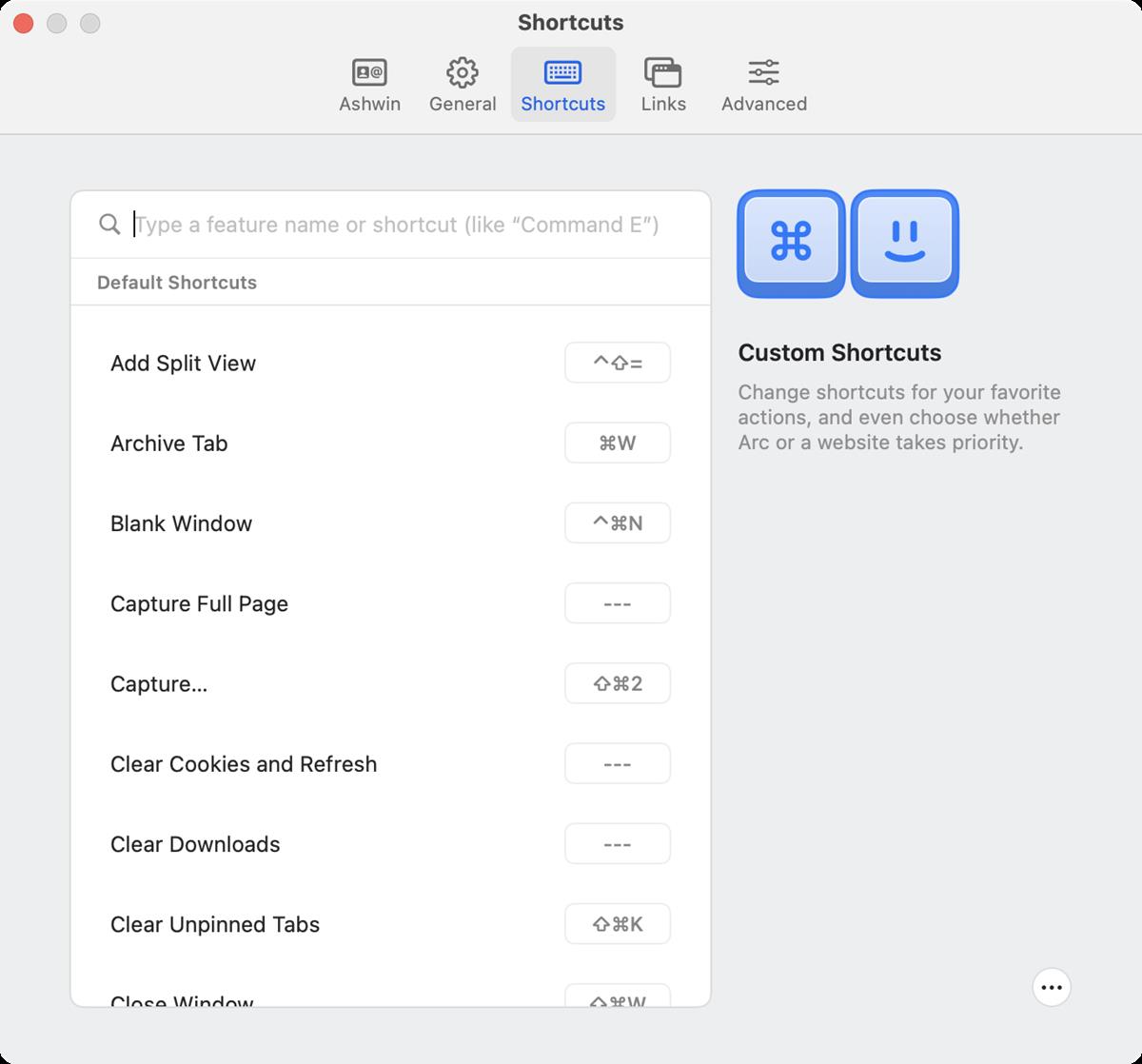
Ctrl + Tab switches between your opened tabs, it also shows a thumbnail preview of each tab. This is quite similar to Command + Tab (Alt + Tab)
Mini Player
Arc has a mini player to play audio and video on websites. It is triggered automatically when you switch from the media's tab. When a tab is playing a video, the mini player pops out into a floating video player aka picture-in-picture mode. It does not have a volume slider.
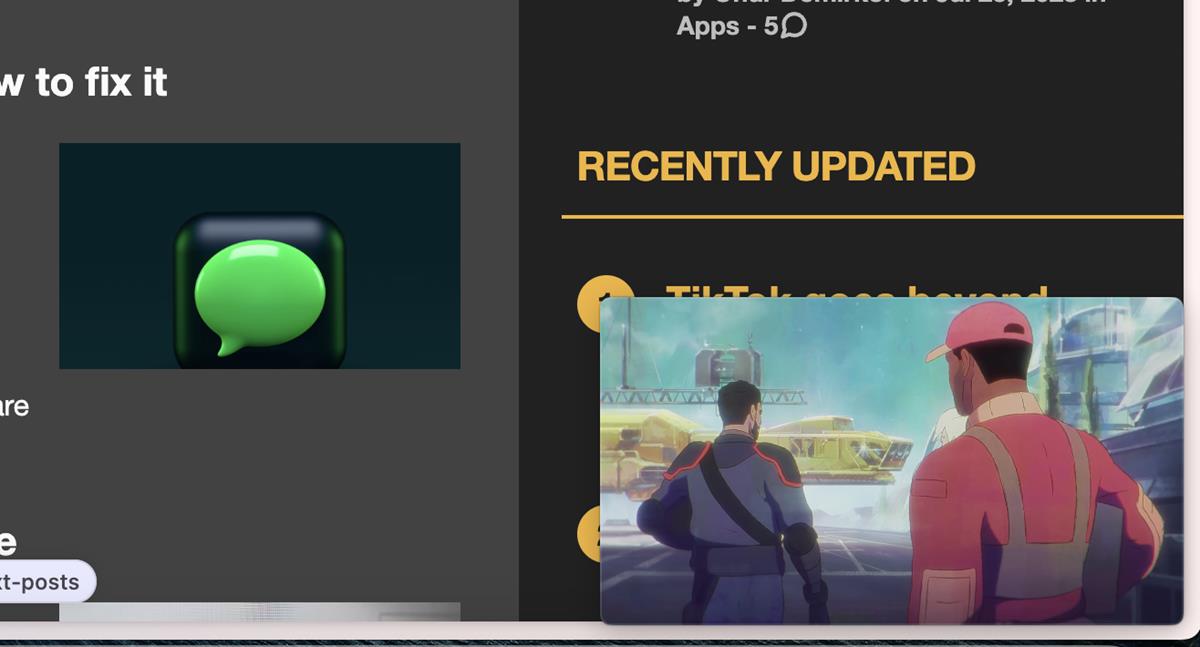
Notes, Easels and Boosts
Want to take notes while browsing the web? Arc has a Notes feature that you can access by clicking the + button at the bottom of the sidebar. Your notes are saved in the notebook automatically. The text editor has some basic formatting options including bold, italics, underlined text, lets you add numbered and bulleted lists, links, and images.
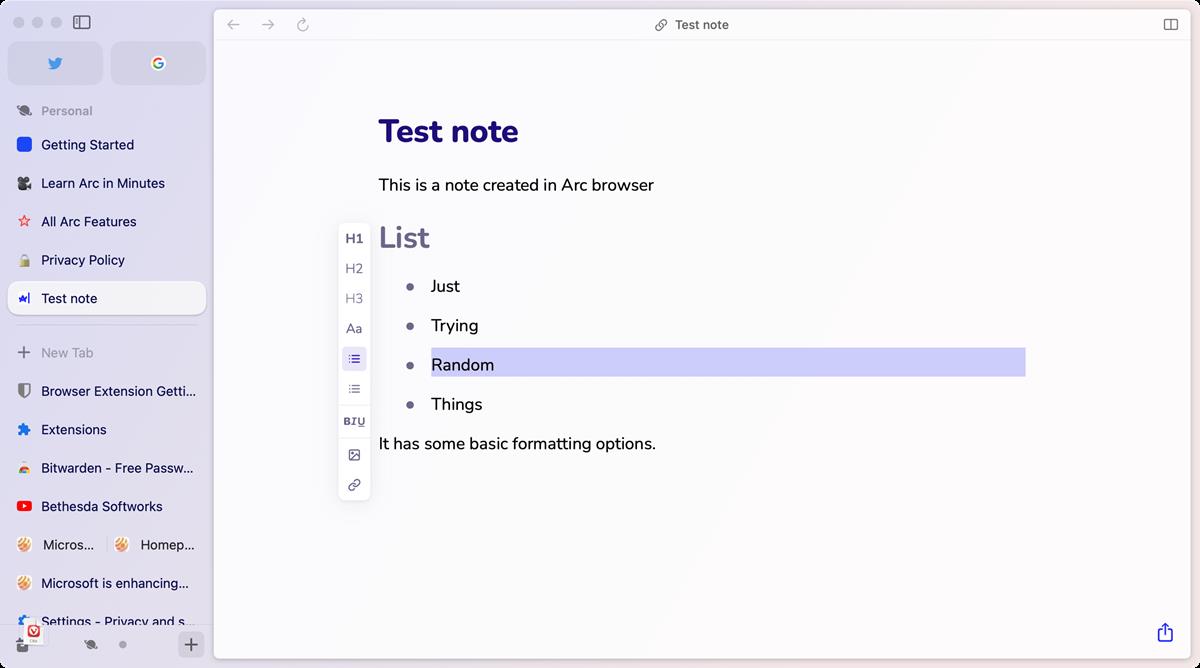
Arc's Easel tool acts like a whiteboard, so you can draw on, write some text, or add images. Like Notes, Easels can be accessed from the browser's sidebar. Once a note or easel has been created, you will find them in a pinned tab in the current space.
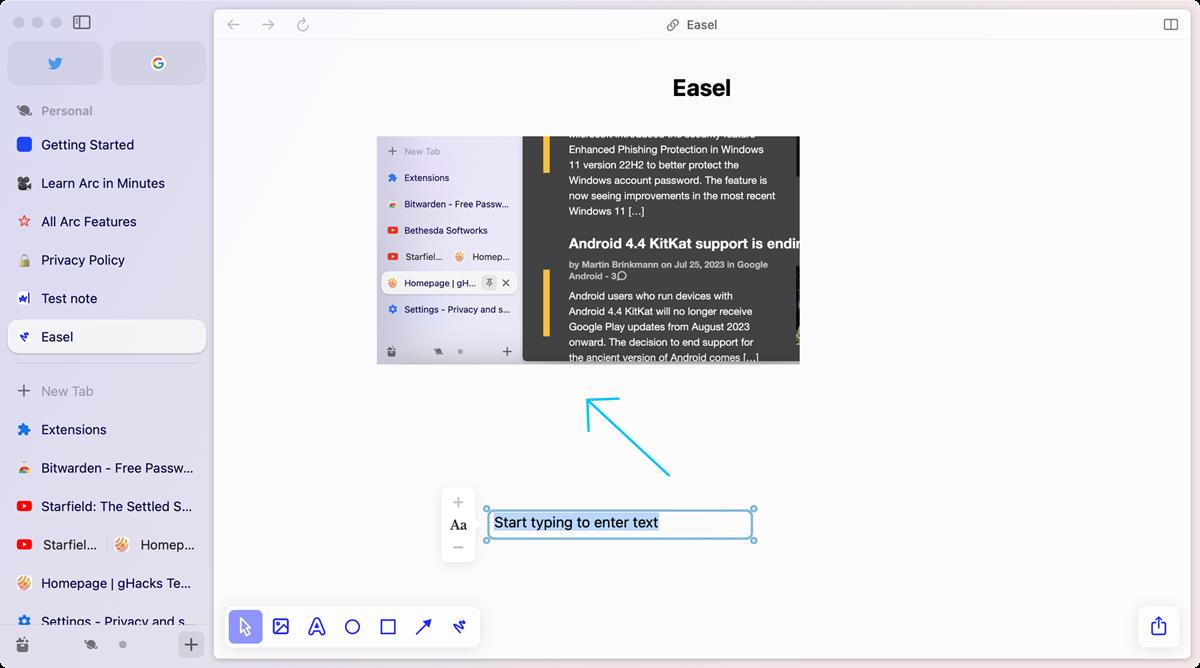
Arc Boosts are essentially customizable themes for websites. It lets you edit the font, colors, and the code (CSS, JavaScript). You can create a Boost by visiting a website and clicking on the paintbrush icon on the URL bar. Users can submit their created Boosts to the Gallery, to share them with other users.
Previews, Focus Mode, Split View and Little Arc
The Previews feature in Arc lets you preview some content (in favorite tabts) without switching tabs.
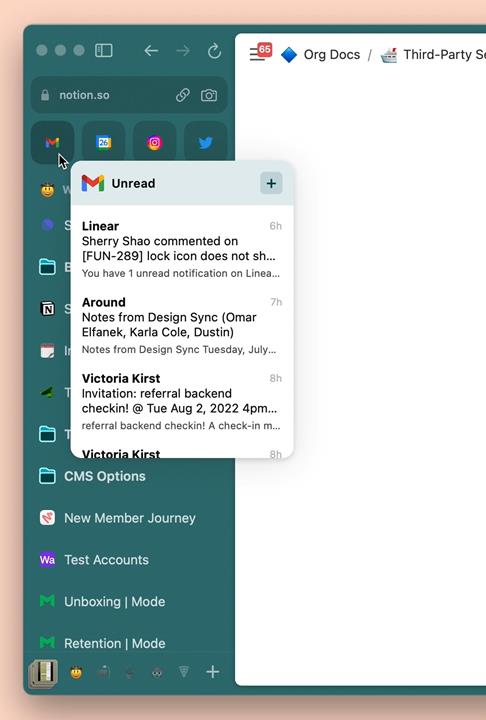
(Image via: The Browser Company)
It works with some websites automatically, including including Gmail, and outlook. This is a pretty neat way to check mails or join calls. Interestingly, this is not merely a hover preview feature, you can interact with the compact version of the preview.
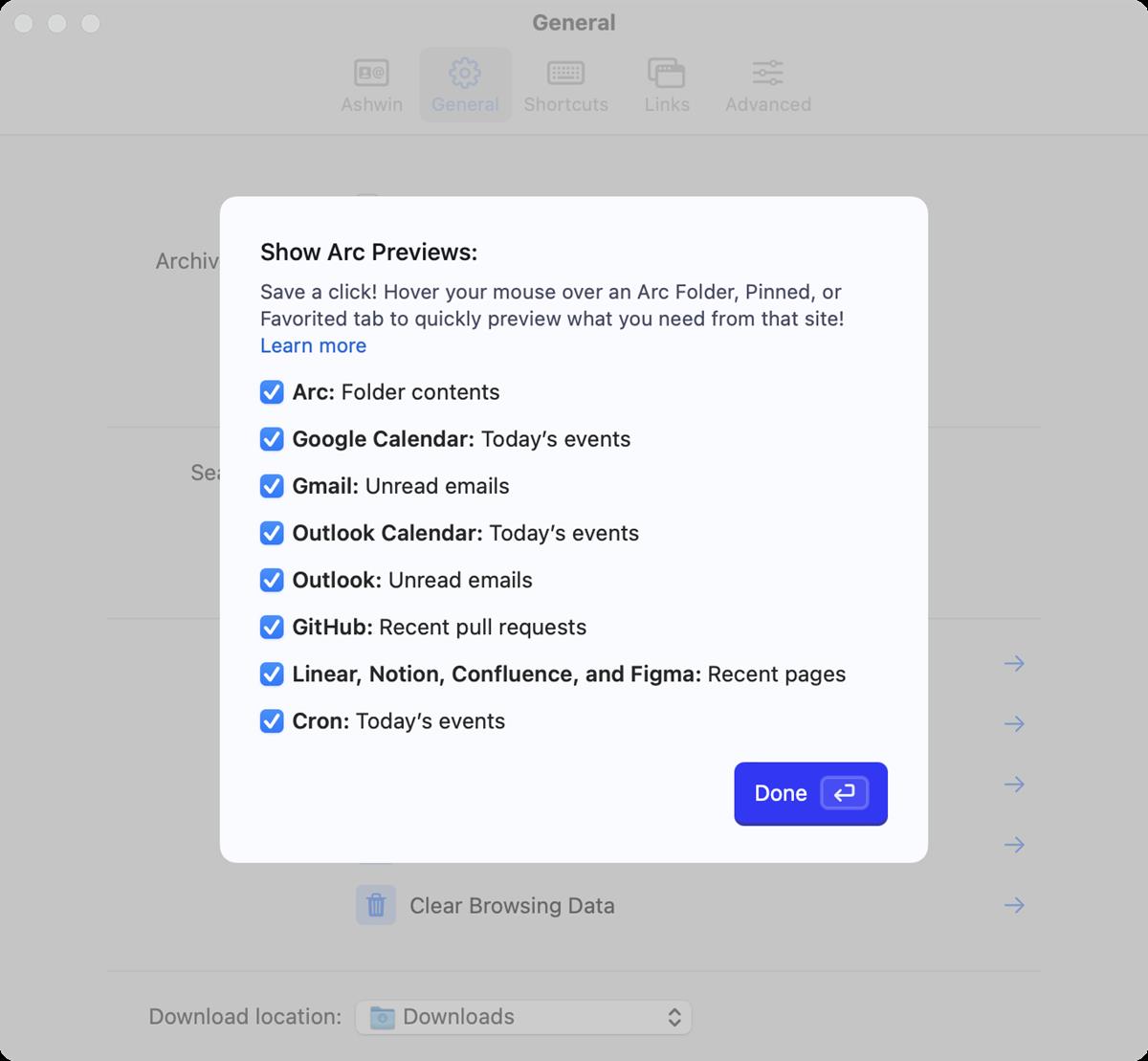
The browser has a special feature called Little Arc, which can optionally open links in a smaller window. Alternatively, you may want to try the built-in Focus Mode for a distraction-free experience in full screen view. Split View in Arc lets you work with multiple tabs at once. You can drag a tab from the sidebar and drop it in the middle of the window to merge the tabs and create a Split View.
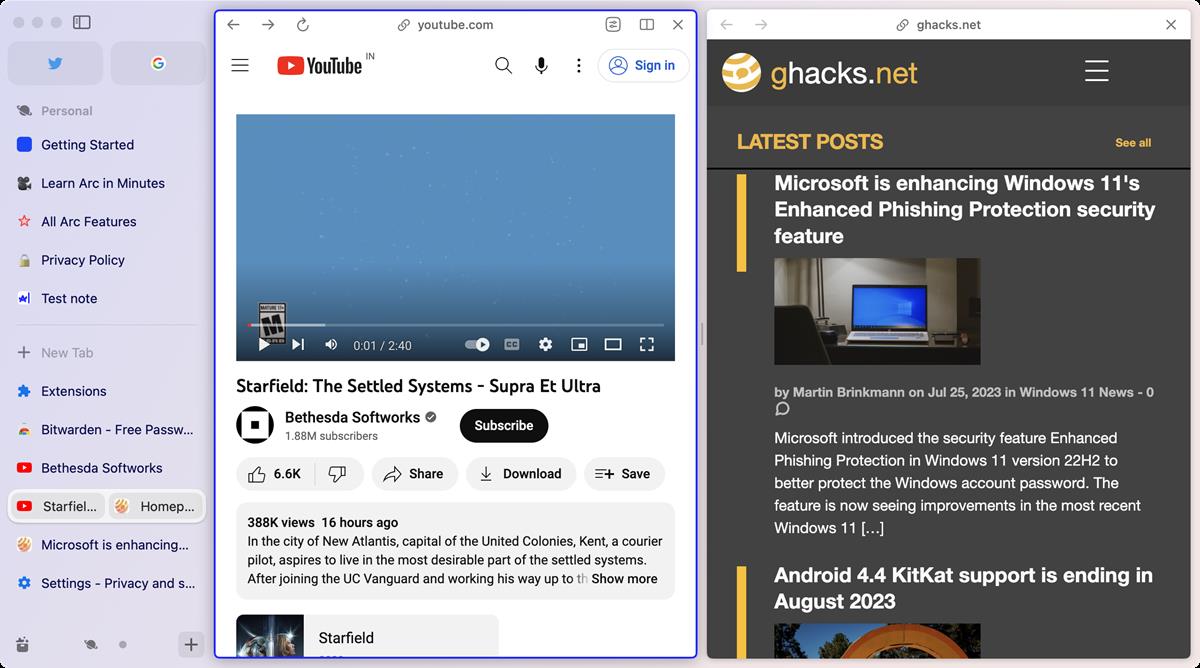
Arc browser lets you import your data from other browsers including Chrome, Safari, Firefox, Brave. You may customize your experience by setting a custom theme.
Arc browser for iOS
Arc for iPhone is available on the App Store. But this is not a web browser, it is a companion app that you can use it to access your spaces, tabs, Notes and Easels that you saved on your Mac. It can also be used to save links from other apps, so it's kind of a read it later app.
I can't say I'm impressed with the iOS app, it feels like Pocket, which is not a bad thing per se, but since it lacks the functionality of a proper browser, you will actually need to use it along side Safari or another browser of your choice.
The cons
The vertical tabs in Arc browser look cool, there's no denying that, but it takes time to get used to the experience. Finding a specific tab by scrolling through the list does feel a bit slow, you may want to use the command bar for a faster way. Arc browser does not use your Google account to sync your data across your devices. It relies on iCloud to sync your spaces, folders, and tabs. On the other hand it does not sync your history, passwords, extensions, and profiles.
Tip: You may want to use a third-party password manager like Bitwarden (and use its Chrome extension) to sync your password across devices.
I would like to point out a couple of other things that might be of some concern to users. The first issue is that Arc browser requires an account to use the app, no other web browser does this. I think this could be a huge hurdle for Arc, a lot of people may not be comfortable with providing their email address to the service. You could do what I did and use an email-alias service like Firefox Relay, Simple Login, etc., which can mask your real email address and forwards the mails to your real inbox.
The other issue is that Arc browser is not open source. Though the browser is based on Chromium, it does have a unique design. I'm assuming the developers want to keep the source code private to protect their UI design, features and other customizations that they created, which is not unlike what Vivaldi does.
As far as privacy is concerned Arc browser says that the company says that it doesn't track your visits to websites, what you type in or search for, it also promises not to sell your data to third parties. I'll leave it to you to decide how privacy-friendly you think Arc browser is, you can find the privacy policy here.
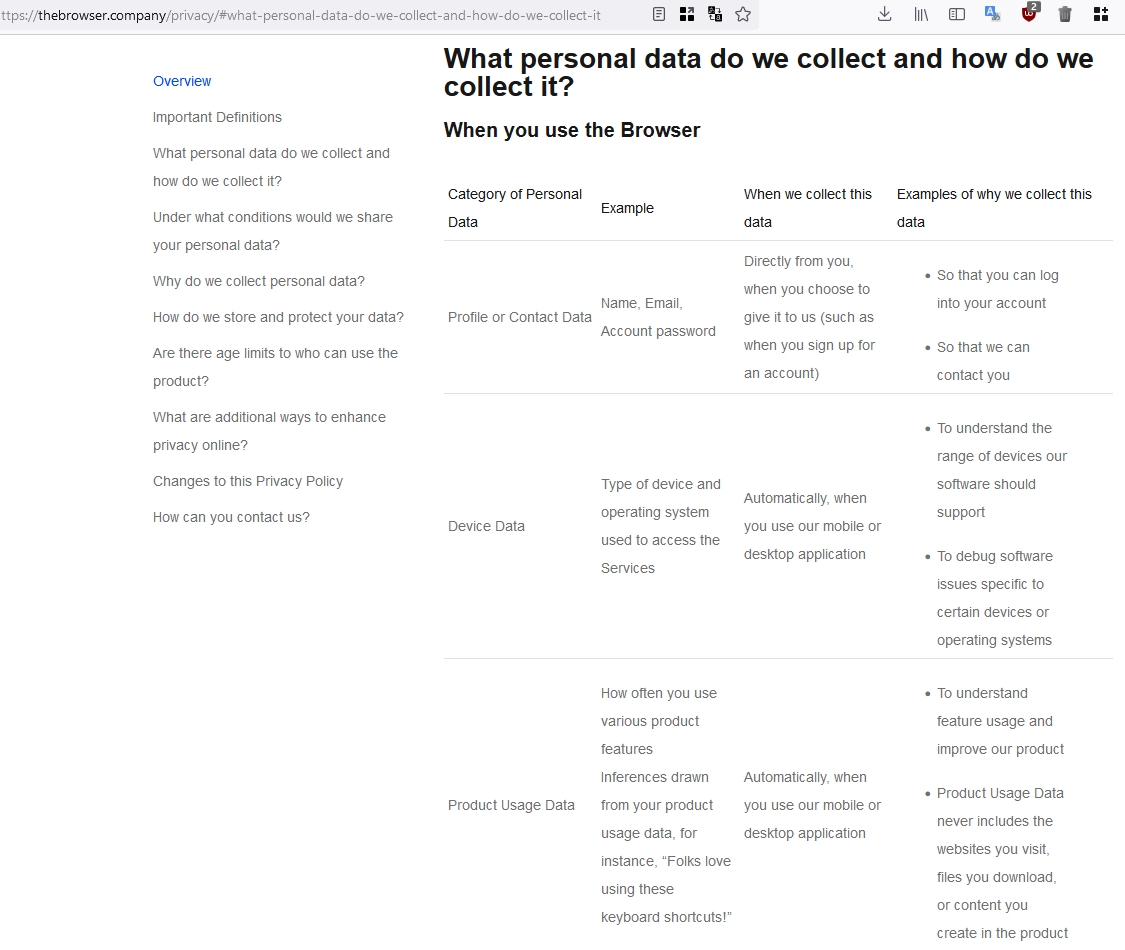
I've been keeping an eye on Arc browser for a while, and have wondered why are other blogs going ooh, ah over it? Frankly it sounded like PR drivel that actually made me stay away from the app. Anyway, I decided to take a closer look and learn about it. Since I wasn't looking to switch over from Firefox, I treated Arc from a neutral perspective, just to explore its features. I think it has a nice design, the tabs experience is rather unique, though the learning curve could be a slight issue.
Apple Safari is getting a feature similar to Spaces in iOS 17, and macOS 14 Sonoma, but Arc's implementation of Spaces does seem to have an advantage. Each space in Arc has its own history, cookies, extensions, and settings. I haven't used the browser long enough to test it extensively, but that's what the developers claim it does. Could this actually be a competitor for Firefox Containers? I think more browsers need to support such anti-tracking options across websites. The other features that stood out to me in Arc were Ctrl Tab, Split View and Notes. These are nice quality-of-life options to have, but aren't really required for the average user.
Try it for yourself, Arc browser is free on Mac. It is compatible with macOS 12 Monterey and above. You may want to check out Arc's resources to learn more about the features in the browser.
That said, Arc browser still needs a lot of work in order to compete with the likes of Chrome, Firefox, Safari, Edge and Brave, if it aims to win users over from the competition. Supporting other platforms would be a good start, speaking of which, Arc Browser for Windows is in the works, and is being built with Swift. It will be released in Winter 2023, you can join the waitlist for it now. Arc for Android is also being planned.








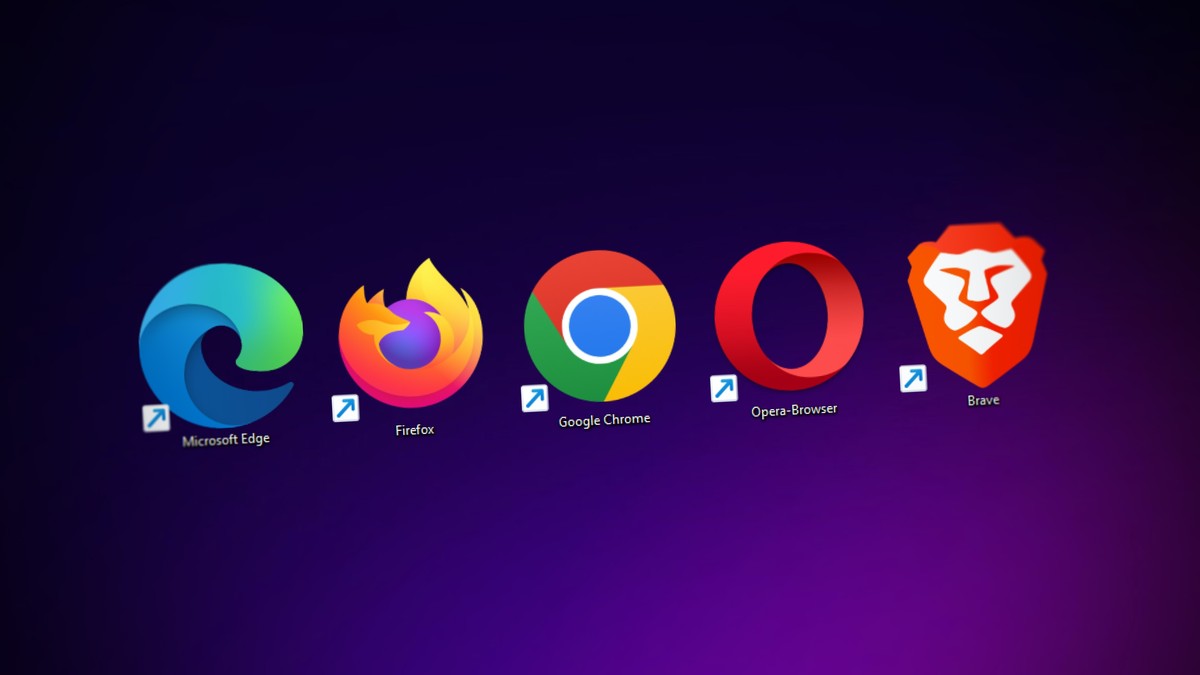









TheVerve published a highly laudatory review of the ARC browser. After I read it the only thing that was clear to me as I absolutely want nothing to do with it.
ARC strikes me as a convoluted mess suitable only for the type of person who enjoys spending a large amount of time fiddling with a browser on an ongoing basis. That is the diametrical opposite of what I am looking for from a browser, not to mention the required sign-in. If I did not mind doing that, I’d have a Microsoft account.
You folks can make up your own minds by taking a gander at: https://www.theverge.com/23462235/arc-web-browser-review
PS I agree with Ashwin that ARC does have a singular strength: PR.
@Mystique/Iron Heart–
All good and fine, but many readers and most Chrome users won’t have a clue what has happened until much too late. It’s the “insidious” wording of Google’s “team of four” [The Web Environment Integrity API has been developed by a team of four Google engineers] that should disturb even members of Congress/EU Parliaments.
Google claims that the idea is to enhance “user privacy” when the reality is to dismember, piece by piece, any user privacy still in existence and blatantly usurp any and all democratic values.
Users won’t get this–maybe a few, 100,000.
“The intro to the Web Integrity API starts out: “Users often depend on websites trusting the client environment they run in. This trust may assume that the client environment is honest about certain aspects of itself, keeps user data and intellectual property secure, and is transparent about whether or not a human is using it.”
The goal of the project is to learn more about the person on the other side of the web browser, ensuring they aren’t a robot and that the browser hasn’t been modified or tampered with in any unapproved ways. The intro says this data would be useful to advertisers to better count ad impressions, stop social network bots, enforce intellectual property rights, stop cheating in web games, and help financial transactions be more secure.”
Not new, only the next manipulative step in a well-planned and orchestrated coup by the corporate military of global democratic governmental systems [of the people, by the people, and for the people] and Internet Freedom.
For example: “Play Integrity (formerly called “SafetyNet”) is an Android API that lets apps find out if your device has been rooted.”
Good background from the following:
https://arstechnica.com/gadgets/2023/07/googles-web-integrity-api-sounds-like-drm-for-the-web/
https://sparrowsnews.com/2023/07/27/google-web-environment-integrity-api/
Wonder what will happen to a cloud browser like Puffin . . . .
Arc Browser is now available for iOS too.
From the article:
“[…] Arc browser is not open source.”
Then it’s not for me.
“Though the browser is based on Chromium, it does have a unique design.”
Great, another browser based on Chromium, just what we need! /s
This reminds me of the retards who release a new Linux distribution with a new desktop theme and little else.
I’ll never use this web browser.
@Mystique
1. Mozilla gets money from Google, $400 million, so they clearly don’t care, why would you?
2. “Web Integrity API” is not even a thing, is just an idea and barely in the ‘draft’ state. So why bring it up? just to make drama about it? that’s a big ridiculous when the feature might not even see a light of real code in Chromium.
Also, Firefox being against or not, wouldn’t matter, if Google implements it, and then web developers start using it, what do you think will happen? Those sites won’t work in Firefox.
Just like today where you can be against DRM all you want, but without a DRM plugin, you can’t watch Netflix or listen to Spotify in the browser.
Guess what? Firefox uses Widevine, which is made by Google, they adopted it like in 2016, after taking years not doing it, so why do you think will be any different with “Web Integrity API”? they will end up having to support it if it becomes a web standard.
3. Firefox supports manifestv3, that should give you an idea how things work in real life and not in your fairy tale.
First, Manifestv3 makes things better, more secure and faster for adblockers because it will be native, native = faster. For example, look at the :has() pseudo-selector vs :has() Procedural Filtering from uBlock, the speed is worlds difference, of course, native :has() is more limited in what it does, but does the job for what it is meant to be used, but we are talking about speed difference and not features.
Manifetv3 adblockers already support most of the relevant settings for the normal user, I doubt someone like you will need the super advanced settings that will not be implemented in Manifestv3 for now or ever.
The only problem about Manifestv3 is filter lists, which are the only real limitation and difference compared with Manifestv2, but then, native adblockers can solve that, just like Brave adblocker is really not to care about Manifestv3 and have all the freedom it wants with its filter lists and features.
The obvious problem is Chromium being in control of the adblocking, then extensions will either have to develop weird workarounds, but I doubt you know how many features can be implemented or not with Manifestv3, and I doubt you even use them today, you are just using Manifestv3 as an excuse to say “Google bad”.
And if you are going to bring the “but Firefox Manifestv3 is going to support webrequest API” well… is that even important?
If developers don’t care and just want to easily develop an extension for Chromium browsers which make 90+% of markets hare, and they don’t want to make use of Firefox’s WebRequest API in Manifestv3, then, how will that even matter?
Firefox is not popular anymore, Safari and Edge are more popular, so unless developers are really passionate about their work which is probably free and they don’t see a cent from it, then I doubt they will really care if Manifestv3 supports WebRequest API or not, if they can develop a single extension and publish it anywhere, and if it doesn’t work in Firefox, complain, and made the necessary tiny fixes to do less work.
So it is funny you praise Firefox and Mozilla, when they are clearly loving Google’s millions and implementing everything.
Do you forget the reason Firefox went the Web Extensions way? it wasn’t because it is better, no, it was because nobody was developing addons for Firefox and they were forced to go Web Extensions to stay relevant.
Better come back in some years if ‘Web Integrity API’ is even implemented, and then look at Mozilla/Firefox and then tell me if it went the “openly shot it down” like if Firefox was relevant or will be relevant in 3, 4 or 5 years.
After all the lies and misinformation about Manifestv3. I am surprised Firefox blind fanboys are still talking about it.
Look at developers like 7tv, releasing Manifestv3 extensions and saying “enjoy slower and a worst experience” to people complaining about the change.
Also, Chromium monopoly was set by Users and companies making forks, it is obvious easier to deal with Chromium code than Firefox code.
People and Companies are fine with their decision, it is faster, and better as well, and more Web Developers care about it, plus you get access to the latest web standards faster.
While, the only Firefox forks are usually vanilla Firefox with some changes to remove the paranoid from vanilla Firefox, just like Librewolf does it… even the “we have uBlock” is not true, because all they do is have a policy to download it, the same way Chromium browsers could do.
But Firefox uses more memory, not even tabs groups implemented, the profiles implementation is terrible… so many cons about Firefox compared to any Chromium browser.
Maybe it is time to either, stop caring or stop talking about it if you are going to use all these misinformation to try to push a point that only you can see in your fairytale, because Firefox has implemented and followed Google’s implementations, included Web Extensions, DRM, Manifestv3…. and they are still getting more and more unpopular.
At least with Mozilla you can enjoy the new Mozilla Echo Chamber in Mastodon, just like Vivaldi did months ago, so nothing new. Maybe there you can post “Chrome sucks, Firefox rocks” and you will get the zombie horde to agree with you, without looking at the present, and past of Mozilla and Firefox, where they literally fired developers so the CEO would get a higher salary, so they really don’t care about Firefox development, they just want to stay alive because of the Google’s money, while making Google’s monopoly better and stronger because by Gecko and Webkit existing, nobody can say Blink has a real monopoly, past the obvious high markets hare, just like Windows and Adobe and Autodesk and big corporations that played their cards correctly to get the power they got in technology.
“But Firefox uses more memory, not even tabs groups implemented, the profiles implementation is terrible… so many cons about Firefox compared to any Chromium browser.”
-Dang man, it’s like, really hard to care.
Literally anything > Chromium
So much text for a Google shilling.
Imagine having to log in to use a Browser, from a no name company nobody knows about but “look how pretty we are”
Chromium based browser… right…
Can we talk about how Google’s “Web Integrity API” and how they plan to control every aspect of your browsing and browser. Can we talk about the fact that Mozilla openly shot it down.
So add that to manifest v3 and the newly implemented Google “Privacy” Sandbox to the long list of garbage.
I would rather have a discussion about that than this.
It’s time we all stop enabling Google.
> Can we talk about how Google’s “Web Integrity API”
+1
I think Martin somehow missed that.
[https://arstechnica.com/gadgets/2023/07/googles-web-integrity-api-sounds-like-drm-for-the-web/]
I am sure Martin and Ashwin are on it. Its a complex problem though so I imagine there is an article in the works.
I am probably a little too fired up over it.
I’m honestly at the point where I believe that blacklisting all chrome and chromium derivatives.
Vivaldi is against it too but whatever they say is useless because they are and have been helping Google create dominance with their own browser based on chromium much like this one in the article. They are as much a part of the problem as Google themselves.
What should happen is that all extension developers should pull support from chrome immediately and let the Chromium users suffer in their own filth. There is no point attempting to try to accommodate the browser or its users anymore as we are just adding to the problems. If they haven’t got it by now then perhaps not having access to valuable extensions will teach them, granted they may not in the future anyway but why wait until it is too late, lets start pushing now. If I am to believe that Chrome/Chromium users have some form of intelligence then I am not quite seeing it. I’m quite happy to leave the diehard scraps of society to use their chrome browser just as we left people to squander away their time on IE just as long as the majority of decent and potentially decent users move over to anything else so we can creating more of a balance and release the web from this scourge.
Another thing that should happen is that all Chromium based browser should either jump ship or sack up and form a union with all other derivatives to build their own extension store whilst building a core engine from the ground up or in similar fashion to what Moon Child has done with Pale Moon but I would argue they need to take it a step much further than that even because anything that seemingly indirectly or directly piggybacks off of Google is not good for the web.
Let’s relaunch web standards and ice out Google and just let them talk from the very distant back seat where they can be seen but not heard.
These are exactly the stunts Google would pull… I’ve said it before Google is playing the long game from multiple angles. This web environment integrity API is bad news. Google fanatics can spin it the way they want but it is and always will be bad for the open web.
@Mystique
> Vivaldi is against it too but whatever they say is useless because they are and have been helping Google create dominance with their own browser based on chromium much like this one in the article. They are as much a part of the problem as Google themselves.
Sorry, but what nonsense is this? Chromium is open source, as such, Vivaldi can choose to disable this component, which for its users, is the same as not implementing it at all. What will that do though? Once major banking websites and streaming services start using it, you better implement it, or you will bleed users. Firefox will be forced to implement it that way too. In fact, they are the most likely to ship it after Google, seeing how there is a complete financial dependence here.
Firefox can shoot down nothing. Brave can shoot down nothing. Vivaldi can shoot down nothing. Too irrelevant, all of them.
There is also no point in “teaching” anyone anything, this sounds like desperation to me. People will use what they want to use, until they are no longer comfortable or happy with what is offered. And that’s that.
I don’t think its nonsense at all. If Mozilla pulled a stunt like this I would say the exact same thing. What it boils down to is the support google is given and empowered by having so many browsers running and that identify as chromium based as an engine what this does is allow google to have more power by using that as leverage to claim dominance over the web and web standards.
All firefox/mozilla has to do is to continue to exist, improve and grab some more market share. Where as vivaldi, brave and every other chromium browser can do nothing because at the core they are essential using chromium which does nothing more than uphold their/googles “web standards” as they see it and call it.
When a website/webmaster identifies that a large demographic is using a chromium based browser then it will not bother trying to code for anything else and that in of itself has been creating a problem for a long time now.
You can bet your bottom dollar if chrome had 2% market share and Firefox had really large percentage that this would not be happening or at the very least they would face huge resistance beyond what we are seeing now for such a stunt.
I have no doubt at all streaming websites will be the first to jump onto this and you can count on youtube being the first in line for that followed by the other major paid streaming suppliers.
They can absolutely use whatever they want just like they did when they did when they stayed on IE. The idea is to not make it comfortable.
You can put icing and sprinkles on shit but it still doesn’t make it a cake.
So if Mozilla is guilty of accepting money from google to run then what is every other chromium browser doing, they’re just as bad if not worse because they are almost entirely dependent on chromium itself.
As you yourself has said before, it costs a lot of money, staff and effort to create your own web engine so where does that leave you?
It’s like as if I were to detest McDonald’s for everything they are and stand for and then have shares in the company and eat there every day.
I know what you are trying to say but there is a bigger picture here that you may have missed.
@Mystique
> Where as vivaldi, brave and every other chromium browser can do nothing because at the core they are essential using chromium which does nothing more than uphold their/googles “web standards” as they see it and call it.
Again, that’s false. They can do the same thing Mozilla does, not supporting it at all. Brave or Vivaldi can choose to disable this component at build time or remove the code if need be. This means they don’t support it for their users, just like Firefox currently does.
I don’t get why you think switching to a different engine improves your position? What can Firefox do against this, that Chromium-based browsers other than Chrome can’t? In the end, if many websites start using it, both Firefox and Chromium-based browsers not implementing this, will start to feel the very same pressure, namely to implement and enable it. It’s not fundamentally different.
> When a website/webmaster identifies that a large demographic is using a chromium based browser then it will not bother trying to code for anything else and that in of itself has been creating a problem for a long time now.
1) They should be doing feature detection and not discriminate by UA. Discriminating by UA is laziness, but easily circumventable at the same time.
2) That Chromium is dominant, has its historical reasons. Mozilla only has itself to blame there, no reason to shame-blame the users when Mozilla messed up over the years.
3) Not all Chromium-based browsers use Chrome’s user agent. The larger ones don’t (Edge, Opera), the smaller ones like Brave and Vivaldi, have to, for compatibility reason (see above, because of lazy UA sniffing).
> You can bet your bottom dollar if chrome had 2% market share and Firefox had really large percentage that this would not be happening or at the very least they would face huge resistance beyond what we are seeing now for such a stunt.
This is hypothetical because Firefox would never have been advertised at Google Search nor would it have shipped as the default browser in Android. If Mozilla owned something like Google Search or were the main developer of Android, they would be the fat corporate entity then. However in terms of their mindset, Google and Mozilla are not much different. Mozilla is very much looking into unique identification of users on the web as well, they also team up with Meta to develop techniques to detect whether or not a human has actually clicked on an ad, for example. Why should I trust this Google subdivision?
> I have no doubt at all streaming websites will be the first to jump onto this and you can count on youtube being the first in line for that followed by the other major paid streaming suppliers.
Yeah OK, that’s right. And what happens then? Firefox will implement it, Chromium-based browsers that had it disabled thus far, will have to enable it. End of story.
> They can absolutely use whatever they want just like they did when they did when they stayed on IE. The idea is to not make it comfortable.
For people looking out for their own convenience, your proposal is the one that will inconvenience them the most. Not implementing this at all, means many of their major websites won’t work in FF, but will in Chrome. Guess what will happen, will they stop watching YouTube and Netflix? Hell no, they will switch to some other conveniently present option like Chrome, which will in turn no longer inconvenience them then.
There will be no widespread protest against Chrome over this. Firefox will bleed users if they refuse to move along (not that they even could refuse, but…).
> You can put icing and sprinkles on shit but it still doesn’t make it a cake.
FF is shit in that sense too, they will have to implement it as well, or become irrelevant even more so than they already are.
> So if Mozilla is guilty of accepting money from google to run then what is every other chromium browser doing, they’re just as bad if not worse because they are almost entirely dependent on chromium itself.
If Mozilla refuses to do something, Google can cut their funding. If e.g. Brave does not implement or enable this in their soft fork of Chromium, Google can do very very little about it. With browsers like Brave or Vivaldi, they would have to hope that major websites implementing this will eventually force them to give in, whereas they can pressure Mozilla much harder.
> As you yourself has said before, it costs a lot of money, staff and effort to create your own web engine so where does that leave you?
Exactly, that’s the issue. In order to do this, Mozilla needs money. Guess where it comes from, they are not independent in that sense.
> It’s like as if I were to detest McDonald’s for everything they are and stand for and then have shares in the company and eat there every day.
Let’s say I like McDonalds food, it’s more like this: One McDonalds has body scanners all over the place and the staff there is terrorizing customers with ads and forcing them to comply with new questionable policies every day. The other McDonalds has a slightly different logo, no body scanners all over the place, the staff leaves customers alone and is shielding them from ads. Whenever the other McDonalds introduces a new policy, the owner of my McDonalds double-checks whether or not that is good for his customers, and only then does this policy get implemented.
As you might have guessed, this is Chrome and Brave. Firefox is like a Burger King that is funded by the evil McDonalds, but pretends like they are their own thing. They will eventually comply with what the evil McDonalds wants, or else.
I can ethically justify eating at my McDonalds. But somehow someway, most people prefer the shitty policies of evil McDonalds up to a degree, or perhaps they only know of evil McDonalds in the first place, so if my good McDonalds does not implement these policies, they will bleed customers.
This is a pretty messed up comparison but I hope it gets the point across.
> I know what you are trying to say but there is a bigger picture here that you may have missed.
You see, the bigger picture is that only Apple is relevant in the browser market next to Google. They (Apple, WebKit) could shoot this down, and for the sake of the web, you should hope that they do. Because Firefox, or minor forks of Chromium that may be opposed to this, can easily be completely ignored and overrun.
I truly appreciate you comments Iron Heart because they have a sense of logic and balance to them without becoming too crazy so thank you for taking this approach to reply here.
This is the type of public discourse I prefer and I should probably tone back my rhetoric because I truly do not want to come across as though Mozilla is a saint. You and I both know they aren’t and we have both discussed this before along with their history and failures of which there are many from 3x upwards.
Mystique:
Where as vivaldi, brave and every other chromium browser can do nothing because at the core they are essential using chromium which does nothing more than uphold their/googles “web standards” as they see it and call it.
Iron Heart:
Again, that’s false. They can do the same thing Mozilla does, not supporting it at all. Brave or Vivaldi can choose to disable this component at build time or remove the code if need be. This means they don’t support it for their users, just like Firefox currently does.
I don’t get why you think switching to a different engine improves your position? What can Firefox do against this, that Chromium-based browsers other than Chrome can’t? In the end, if many websites start using it, both Firefox and Chromium-based browsers not implementing this, will start to feel the very same pressure, namely to implement and enable it. It’s not fundamentally different.
Mystique Reply:
Yes, it will just as much become a problem for vivaldi and or Brave if they Google do implement this as it may come as a modified browser or not fall within the Google Guidelines which is bad for everyone. My concerns are that this goes way beyond the simple browser and becomes enforced by websites which gives them way too much power, a kind of power that should not be in the hands of anyone be it google or even mozilla for that matter.
—————-
Mystique:
When a website/webmaster identifies that a large demographic is using a chromium based browser then it will not bother trying to code for anything else and that in of itself has been creating a problem for a long time now.
Iron Heart:
1) They should be doing feature detection and not discriminate by UA. Discriminating by UA is laziness, but easily circumventable at the same time.
2) That Chromium is dominant, has its historical reasons. Mozilla only has itself to blame there, no reason to shame-blame the users when Mozilla messed up over the years.
3) Not all Chromium-based browsers use Chrome’s user agent. The larger ones don’t (Edge, Opera), the smaller ones like Brave and Vivaldi, have to, for compatibility reason (see above, because of lazy UA sniffing).
Mystique Reply:
1. They can but they don’t. Just like coding for both web browsers is pure laziness and cheapness.
2. Absolutely they are but they aren’t the only reason by they did not help at all by handling things in such a way to disenfranchise it’s user base and community as well as its developers too. Essentially the entire culture changed.
3. And that really is a problem. Brave should not have to live in the shadows of chrome but this is what things will come to again and it is not right.
—————
Mystique:
You can bet your bottom dollar if chrome had 2% market share and Firefox had really large percentage that this would not be happening or at the very least they would face huge resistance beyond what we are seeing now for such a stunt.
Iron Heart:
This is hypothetical because Firefox would never have been advertised at Google Search nor would it have shipped as the default browser in Android. If Mozilla owned something like Google Search or were the main developer of Android, they would be the fat corporate entity then. However in terms of their mindset, Google and Mozilla are not much different. Mozilla is very much looking into unique identification of users on the web as well, they also team up with Meta to develop techniques to detect whether or not a human has actually clicked on an ad, for example. Why should I trust this Google subdivision?
Mystique Reply:
Absolutely true. Perhaps my wording was poorly laid and I did not convey my thoughts correctly in my haste to speak. Neither Google or Mozilla should have this much power. Anytime anyone does it presents a problem to the open web.
This displeases me greatly that Mozilla would do such a thing but it is hardly surprising given how they have shifted and developed these days. I believe I may have made a comment here when it was brought up as an article that Meta and Mozilla were working together.
We shouldn’t really be trusting either of them but keeping a balance of power is important.
But this is also a hypothetical too. The balanced approach is the correct one that neither browser or corporation have control. Which takes us to web standards being hijacked.
—————–
Mystique:
I have no doubt at all streaming websites will be the first to jump onto this and you can count on youtube being the first in line for that followed by the other major paid streaming suppliers.
Iron Heart:
Yeah OK, that’s right. And what happens then? Firefox will implement it, Chromium-based browsers that had it disabled thus far, will have to enable it. End of story.
Mystique Reply:
Being forced to implement it is wildly different to developing it and forcing it upon others which is where google is. Disabling it on the browser end will not do much because you may just be flagged as tampering with the browser which yes puts it at odds in a similar way it does firefox but they are hardly in line with one another.
———————–
Mystique:
They can absolutely use whatever they want just like they did when they did when they stayed on IE. The idea is to not make it comfortable.
Iron Heart:
For people looking out for their own convenience, your proposal is the one that will inconvenience them the most. Not implementing this at all, means many of their major websites won’t work in FF, but will in Chrome. Guess what will happen, will they stop watching YouTube and Netflix? Hell no, they will switch to some other conveniently present option like Chrome, which will in turn no longer inconvenience them then.
There will be no widespread protest against Chrome over this. Firefox will bleed users if they refuse to move along (not that they even could refuse, but…).
Mystique Reply:
I have absolutely no doubt that people will conform. It has been displayed time and time again but the goal is to tip the balance a little more to make the users rethinking their standing. When the trade off becomes too great that the users will have no choice but to turn their backs on the browser, the websites that enforce it and everything else in between.
It’s the same thing as businesses. If they can run a company on much fewer people even once then they will automatically assume they can do it every time which ultimately leads to a terrible experience. If you give them an option then scumbag companies will always take it.
————————-
Mystique:
You can put icing and sprinkles on shit but it still doesn’t make it a cake.
Iron Heart:
FF is shit in that sense too, they will have to implement it as well, or become irrelevant even more so than they already are.
Mystique Reply:
They’re shit for many other reasons but not on this at least not yet. It shouldn’t even get to the point of choosing weather to add it or not but I suppose this is just a semi implemented proposal but I do absolutely feel we all need to fight this.
—————————
Mystique:
So if Mozilla is guilty of accepting money from google to run then what is every other chromium browser doing, they’re just as bad if not worse because they are almost entirely dependent on chromium itself.
Iron Heart:
If Mozilla refuses to do something, Google can cut their funding. If e.g. Brave does not implement or enable this in their soft fork of Chromium, Google can do very very little about it. With browsers like Brave or Vivaldi, they would have to hope that major websites implementing this will eventually force them to give in, whereas they can pressure Mozilla much harder.
Mystique Reply:
And yet still likely to exist and perhaps even grow under the wings of Open Source and return to its roots. If Brave or Vivaldi doesn’t implement it they can do very little other than flag them as a tampered browser and prevent them from visiting many websites that will undoubtedly support and implement this and you can bet that websites will then begin showing ads, and all sorts of money making schemes not limited to blocking ads or tracking, profiling etc.
My view is that these browsers are indirectly complicit. They may disagree with Google but a stronger stance would be to have no relation to Google at all in a technical or monetary the same can said for mozilla too.
——————————
Mystique:
As you yourself has said before, it costs a lot of money, staff and effort to create your own web engine so where does that leave you?
Iron Heart:
Exactly, that’s the issue. In order to do this, Mozilla needs money. Guess where it comes from, they are not independent in that sense.
It is part of the issue. I’m not happy that Mozilla takes money from Google but that is something that they do to pay their CEO exorbitant amounts of money for no reason other than greed so to balance this we will consider it this way.
Brave uses chromium to undo Google’s stupidity but it is still based on Google’s work which are the true enemy of everyone.
Waterfox, Floorp, Librewolf, etc attempt to undo Mozilla’s stupidity but is still based on Mozilla’s work but the difference is as of right now Google is attempting to control everything in favor of themselves as well as commercial enterprise on a fundamental level and reshape the internet with them as the universal ruler. This is a far worse than anything Mozilla is doing right now.
I personally feel it would be a blessing if development completely split off from Mozilla’s clutches because right now they just appear to be hampering things and misappropriating funds such as spending on some garbage AI on top of paying themselves far too much whilst cutting developers, not paying the actual developers enough, embracing the community contributors and hampering the overall project by trying to create some sort of mega identity tied back to them. I don’t think they would need all that money to be absolutely honest and you and I both know that.
———————-
Mystique:
> It’s like as if I were to detest McDonald’s for everything they are and stand for and then have shares in the company and eat there every day.
Iron Heart:
Let’s say I like McDonalds food, it’s more like this: One McDonalds has body scanners all over the place and the staff there is terrorizing customers with ads and forcing them to comply with new questionable policies every day. The other McDonalds has a slightly different logo, no body scanners all over the place, the staff leaves customers alone and is shielding them from ads. Whenever the other McDonalds introduces a new policy, the owner of my McDonalds double-checks whether or not that is good for his customers, and only then does this policy get implemented.
As you might have guessed, this is Chrome and Brave. Firefox is like a Burger King that is funded by the evil McDonalds, but pretends like they are their own thing. They will eventually comply with what the evil McDonalds wants, or else.
I can ethically justify eating at my McDonalds. But somehow someway, most people prefer the shitty policies of evil McDonalds up to a degree, or perhaps they only know of evil McDonalds in the first place, so if my good McDonalds does not implement these policies, they will bleed customers.
This is a pretty messed up comparison but I hope it gets the point across.
Mystique Reply:
Hahaha, I apologize for the poor comparison but I see the point you are trying to make however at the end of the day the money still goes back to McDonalds so it doesn’t do much really but if Mozilla was Burger King then at least the money isn’t going back to McDonalds. It just technically will give people a false sense of security. It’s undermining the entire mission really. I feel like Brave can do a lot better for itself really than to associate itself with Google. It’s as if they are handing out flyers for Google at this point, yes they undo a lot of garbage Google does but it is still supporting it indirectly too by virtue of running the same engine, it adds to Googles dominance. It sends the wrong message to web developers/webmasters and ultimately leads to garbage like this.
—————————-
Mystique:
I know what you are trying to say but there is a bigger picture here that you may have missed.
Iron Heart:
You see, the bigger picture is that only Apple is relevant in the browser market next to Google. They (Apple, WebKit) could shoot this down, and for the sake of the web, you should hope that they do. Because Firefox, or minor forks of Chromium that may be opposed to this, can easily be completely ignored and overrun.
Mystique Reply:
Apple is also guilty of this kind of behavior too and have always attempted to have extreme control over things. I doubt they will. The only reason why they would is because they aren’t the ones in control this time.
Apple is only relevant because of their mobile market and that is it. Google fortified itself through many methods such as being deeply woven in android and also dictating web standards and acquiring large websites such as Youtube that largely lays unchallenged.
When I said Mozilla shot it down I didn’t mean they stopped it, they just objected to it which is at least something but you are right, they can’t stop it nor can anyone else really and that essentially is part of the problem. We probably all should band together against this.
I just get the impression that Google will do what they want anyway just as they did with everything else and we should be prepared for that. You, I and everyone on this website (even the ones that hate me) ultimately want what is best but I am just not sure that we are going to be able to fight it this way any longer. Google absolutely has to lose market share by a significant portion to restore some sort of balance because right now Google has the ultimate say in everything no matter what anyone says. This could also put browser development or new comers completely out of scope.
This is a threat to all users and all browsers including Brave and Vivaldi but I still take a dim view of chromium based browsers for being a part of the entire collective.
If Mozilla had this much power and pulled a stunt like this I would advocate for its downfall too. It’s not good at all. These are the kind of fights we cannot afford to lose.
If they do implement this and then I hope there is huge fall out and those websites end up closing up as too does Google. The entire collapse of an empire.
I would rather believe in that than rolling over and allow this kind of garbage to happen and if that makes me foolish then so be it but you have to draw the line in the sand somewhere and this is that line for me… if it isn’t for you then where is it? Where is it for anyone?
Once again I do appreciate your comments and opinion and thank you for bringing it up in such a way that does not appear to be completely unhinged. I am sure at some point an article will come up here if not soon then in the distant future when things may heat up a little more and I am sure we will continue it then also.
This comments system makes it hard to have a long winded discussion sometimes and I am sure there are few people that will bother reading what we wrote and laughingly consider us both lunatics hahaha and I guess in some ways I am. lol
We are also terribly off-topic and it’s entirely my fault. I hope these comments stay though.
Am currently on vacation, but have this on my agenda.
@Martin I hope you have a really nice vacation and look forward to your return and articles.
Ashwin is doing fine.
I think its harder to get a handle on articles when there is so much going on at the same time and only so many keen writers.
@Martin Brinkmann
Was my comment lost in space?
I’m seeing a lot of your comments Iron Heart. Some very good ones.
> Can we talk about how Google’s “Web Integrity API” and how they plan to control every aspect of your browsing and browser.
Is it about this topic,
Google wants to kill open Web under the guise of making it safer
July 24, 2023
https://adguard.com/en/blog/google-api-open-web-adblocking.html
I don’t want to blame Ashwin for writing this article, but
The lineup of “Ghacks” articles (which should be carefully selected from a global bird’s-eye view, and reviewed as Ghacks) is inconsistent, and while the number of articles has increased, the quality of the articles has declined.
Ghacks should make a clear distinction between priority topics as Ghacks as long as it has the sign of “Ghacks Technology News”.
I am increasingly disappointed with the recent Ghacks Technology News.
Google’s “Web Integrity API” ,
Unpacking Google’s new “dangerous” Web-Environment-Integrity specification | vivaldi.com
https://vivaldi.com/blog/googles-new-dangerous-web-environment-integrity-spec/
Why Vivaldi browser thinks Google’s new proposal, the Web-Environment-Integrity spec, is a major threat to the open web and should be pushed back.
By Julien PicalausaJuly 25, 2023
Web Environment Integrity was already intended to be prototyped in May, and work is underway.
Web environment integrity API | Chrome Platform Status
https://chromestatus.com/feature/5796524191121408
@Mystique
How can Mozilla shoot down anything, with 3% overall market share? Is this sarcasm? :………………D No, the proposal is still fully on the table, just as much as it was before.
I low key predicted Google going down the DRM route here, perhaps you remember this comment:
https://www.ghacks.net/2023/06/29/youtube-intensifies-crackdown-on-adblockers-with-this-new-restriction/#comment-4569134
I was on the right path, but only considered content-related Widevine (e.g. YouTube videos), not DRM for entire websites, lol. They are more insidious than I predicated they would be anyway. Google made a similar proposal called “Web Bundles” already, this would already have meant shipping websites as if they were PDFs… more or less. They added new stuff like attestation here, possibly Microsoft inspired them here when MS introduced Pluton. Attestation from the hardware level to the operating system level to the browser level, an absolute wet dream of Big Tech is unfolding here.
You wrongly blame Chromium for this – except, Chromium-based browsers other than Chrome have a choice to disable this by default. But, once important banking websites and streaming websites and other go-to websites start using it, and if they work in Chrome, other Chromium-based browsers like Brave, Vivaldi, and non-Chromium browsers like Firefox, will no choice but to follow through with this. They are just too unimportant, to make a difference. People are rallying behind Mozilla over this, as I’ve noticed, but ultimately, I feel they are the likeliest to implement this after all, just behind Google. Because they are entirely dependent on their money.
Also, the Electronic Frontier Foundation, an organization I would normally respect, is absolutely quiet on this so far. This could change of course, but at the moment it’s pretty awful.
“You wrongly blame Chromium for this – except, Chromium-based browsers other than Chrome have a choice to disable this by default”
Exactly. Big Brother Iron Heart knows what is best for you. The best is Google Chromium. To think otherwise is a thought crime.
Nice, and very long, discussion.
Darn! This was a great comment and I missed it.
Definitely something to think about.
Something we will more broadly have to discuss when its on topic.
Once again I appreciate your comment and considerate answers.